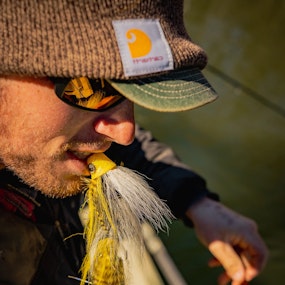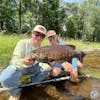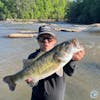S6, Ep 45: Matt Reilly's Post-Spawn Smallmouth Strategies and Topwater Tips
Host Marvin Cash is joined by Southwest Virginia's own Matt Reilly on The Articulate Fly for an insightful fishing report that anglers won't want to miss. Matt shares his observations on the recent weather patterns and how they're influencing post-spawn smallmouth bass behavior in the region.
In this episode, Matt delves into the nuances of fishing during the transitional post-spawn period, offering tips on how to adjust tactics for fish that are recovering from the rigors of spawning. He provides a detailed analysis of river conditions and the impact of fluctuating water temperatures on fish activity, including the shift from pre-spawn to post-spawn stages.
Listeners will learn about the importance of handling fish responsibly during this sensitive time and gain an understanding of the various factors that contribute to a successful catch. Matt also answers a listener's question about the key river indicators for when to start focusing on topwater fishing, giving valuable advice on the types of topwater tactics to employ based on water temperature, bug activity and fish behavior.
Whether you're planning your next fishing trip or simply looking to deepen your knowledge of smallmouth bass habits, this conversation with Matt Reilly is packed with practical advice and fascinating insights. So grab your gear, tune in and get ready to elevate your fishing experience in Southwest Virginia.
To learn more about Matt, check out our full length interview.
All Things Social Media
Follow us on Facebook, Instagram, Twitter and YouTube.
Support the Show
Subscribe to the Podcast
Subscribe to the podcast in the podcatcher of your choice.
Advertise on the Podcast
Is our community a good fit for your brand? Advertise with us.
In the Industry and Need Help Getting Unstuck?
Check out our consulting options!
Speaker:
Marvin: Hey folks it's Marvin Cash the host of the articulate fly and we're back with
Speaker:
Marvin: another southwest virginia fishing report with Matt Riley how are you doing Matt I'm.
Speaker:
Matt: Doing great man how are you.
Speaker:
Marvin: As always I'm just trying to stay out of trouble and you know I think finally
Speaker:
Marvin: uh we've got this kind of funky early spring weather out of our system and it
Speaker:
Marvin: looks like we're kind of back to kind of typical warming trend and no crazy like 32 degree nights.
Speaker:
Marvin: And I think that might be a trend that's going to continue. That's what Ellis Ward says anyway.
Speaker:
Matt: He didn't know what the hell he was talking about.
Speaker:
Matt: Yeah, today was kind of an odd day.
Speaker:
Matt: We had a couple, you know, Sunday was, or I don't know what day it is,
Speaker:
Matt: Monday was kind of a scorcher.
Speaker:
Matt: I think we hit like 88, 90, at least up in, I was fishing up in Lynchburg,
Speaker:
Matt: but we had a bit of a cold front roll through today.
Speaker:
Matt: We had some wind and I think the high was like 70, 67, something like that, a little bit of rain.
Speaker:
Matt: But it's looking like it's going to be in the kind of mid 70s to mid 80s for
Speaker:
Matt: the foreseeable future.
Speaker:
Matt: I wouldn't say a fair bit of rain, but there's a chance of rain about every
Speaker:
Matt: day in the forecast starting this weekend.
Speaker:
Matt: So things are looking to be kind of damp and seasonable.
Speaker:
Matt: So yeah, all good.
Speaker:
Marvin: Yeah, and I would imagine, right, probably more post-spawn fish than pre-spawn
Speaker:
Marvin: smallmouth at this point?
Speaker:
Matt: Uh correct yeah depending on where you are um volume of fish in the system and all that um.
Speaker:
Matt: But i would say we're we're certainly postponed a
Speaker:
Matt: couple weeks postponed um and i was actually talking to a client of mine about
Speaker:
Matt: that on the phone you know when i say post spawn i'm i'm really referring to
Speaker:
Matt: you you kind of make it mean a couple of different You could refer to the summer as post-spawn,
Speaker:
Matt: you know, like diffusion throughout the river, set up the feed.
Speaker:
Matt: Spawn's totally over.
Speaker:
Matt: When I say post-spawn, I'm referring to fish that have already,
Speaker:
Matt: like, dropped eggs and fertilized them, you know.
Speaker:
Matt: So, males that are sitting on nests, I will either call nest guarding males
Speaker:
Matt: or I'll call them post-spawn males. And then, you know, females that have dropped
Speaker:
Matt: eggs, they're immediately postponed as well.
Speaker:
Matt: And they obviously don't garden nests like the males do, but it just,
Speaker:
Matt: it creates a certain attitude and demeanor within the fish.
Speaker:
Matt: So it's something you have to consider. But yeah, our pretty standard timing
Speaker:
Matt: throughout southwest central Virginia is somewhere between like the 12th of
Speaker:
Matt: April and the 18th of April.
Speaker:
Matt: You're going to have a wave go off if temperatures are anywhere near 60 in that
Speaker:
Matt: range just about every year.
Speaker:
Matt: So we're certainly, I would say, about two weeks post the first wave of spawning fish.
Speaker:
Marvin: Yeah, got it. And I guess, you know, it goes without saying don't fish to the
Speaker:
Marvin: males on the nests. But, you know, I also know that kind of,
Speaker:
Marvin: you know, we'll just say, you know, not summer post-spawn, but near post-spawn
Speaker:
Marvin: kind of puts the fish in a funk.
Speaker:
Marvin: You know, how long is it going to take for that to kind of work through the
Speaker:
Marvin: system before kind of the bite starts to kind of come back?
Speaker:
Matt: Yeah, it's, it's, uh, you know, again, it might be more information than you
Speaker:
Matt: want, but, um, this is just what goes through my head every day.
Speaker:
Matt: And it's, it's, it's a valuable context because a lot of people don't know what
Speaker:
Matt: they're looking at. You know, males on nests are guarding, and they don't really
Speaker:
Matt: do a lot of actual eating.
Speaker:
Matt: I mean, they will eat something that comes near their nest, or they'll just
Speaker:
Matt: pick it up and try to move it, or they'll try to kill it or just wrap it or something.
Speaker:
Matt: But a lot of times what you get from those fish are just, you know,
Speaker:
Matt: you'll toss your fly, whether it be a streamer or popper or something,
Speaker:
Matt: up into an area with a nest in it.
Speaker:
Matt: And you'll get this fish just kind of lazily following it out.
Speaker:
Matt: And that can be frustrating if you don't know what you're looking at because
Speaker:
Matt: it seems like, you know, a fish just followed your fly and didn't eat it.
Speaker:
Matt: But really what it is, is a fish that's just not really actively feeding and
Speaker:
Matt: has other things on its mind.
Speaker:
Matt: And it's just kind of seeing a potential predator out of its zone.
Speaker:
Matt: Sometimes they'll come over and eat something or mouth it and you just get this
Speaker:
Matt: kind of uninspired take.
Speaker:
Matt: And, you know, very easy to catch guardian males if you don't know exactly where
Speaker:
Matt: they are. So, generally speaking, this time of year, I just encourage people
Speaker:
Matt: and I try myself to just fight fish as quickly as possible and put them back.
Speaker:
Matt: You know, don't keep them in the net for five minutes and take a bunch of pictures
Speaker:
Matt: and, you know, just kind of be done with it.
Speaker:
Matt: But the females, and when a male gets on a nest, it'll be two to three weeks
Speaker:
Matt: before, about two weeks before you have fries swimming up.
Speaker:
Matt: And then, you know, probably a month very safely, you know, before they're back
Speaker:
Matt: out in the river with no parental responsibilities. Yeah.
Speaker:
Matt: And that goes for, you know, all of them. The females, once they spawn,
Speaker:
Matt: they're just, you know, pretty tired, lazy.
Speaker:
Matt: And they'll hang near those spawning areas, but they're just,
Speaker:
Matt: they're going to be tough to locate if you don't know exactly where.
Speaker:
Matt: And it can be very specific places where they'll kind of hole up.
Speaker:
Matt: And they can be tough to feed because they are just, you know,
Speaker:
Matt: they don't have a lot of energy. They're not real actively chasing things down.
Speaker:
Matt: So in order to find those bigger fish, all the 20 plus inch fish in the river
Speaker:
Matt: system are going to be females for the most part.
Speaker:
Matt: In order to catch those fish, it's hard to do it consistently unless you just
Speaker:
Matt: have a lot of really good data post-spawn.
Speaker:
Matt: You generally have to slow things way down.
Speaker:
Matt: And and fish to some specific areas um and
Speaker:
Matt: that you know that'll last a couple
Speaker:
Matt: of weeks basically just long enough for those fish to
Speaker:
Matt: kind of get their strength back and kind of integrate back into the the greater
Speaker:
Matt: um river system so a couple weeks to a month basically before it's all said
Speaker:
Matt: and done and before that you know you're just kind of fishing other other areas you're You're fishing,
Speaker:
Matt: well, one area I tend to find a lot of those post-bomb females is kind of more mid-river, vertical,
Speaker:
Matt: fairly dramatic structure.
Speaker:
Matt: And, you know, otherwise just fishing current seams and stuff like that,
Speaker:
Matt: you know, where you'll find fish that are not actively guarding nests.
Speaker:
Marvin: Yeah, got it. And got a question for you from Josh. She wanted to get your thoughts
Speaker:
Marvin: on key river indicators that tell you to start focusing on topwater fishing.
Speaker:
Matt: Um yeah okay um
Speaker:
Matt: the i'll just
Speaker:
Matt: kind of go off off the cuff here i guess there's really
Speaker:
Matt: i say this a lot but there's a couple of different genres of
Speaker:
Matt: top water fishing um if we're talking bug
Speaker:
Matt: fishing um which is
Speaker:
Matt: generally a fairly passive um you
Speaker:
Matt: know finesse kind of tactic um one
Speaker:
Matt: it's real helpful to have bugs out and about you know i
Speaker:
Matt: i think i saw i know i saw the first
Speaker:
Matt: you know dragon flies damsel flies of the
Speaker:
Matt: year in the last two weeks on my rivers and so that's significant but you know
Speaker:
Matt: certain smaller rivers you've got a big kind of drake mayflies flying around
Speaker:
Matt: a lot in the spring caddis flies even earlier in march you know if you've been
Speaker:
Matt: in a small creek or stream
Speaker:
Matt: in March or April and you have pretty shallow clear water.
Speaker:
Matt: Um, it's, it's not out of the question to think that you might,
Speaker:
Matt: might be able to catch some fish on top water flies.
Speaker:
Matt: Um, and so, you know, certainly looking for the presence of bugs,
Speaker:
Matt: water temps that are generally, you know, depending again on how big or deep
Speaker:
Matt: your river system is a pretty shallow river system, You could probably start fishing in the 50 to,
Speaker:
Matt: I mean, I'd say probably 55 to 60 degree rain if the water's low to normal.
Speaker:
Matt: Just understand that when you're in that water temperature range in the spring,
Speaker:
Matt: you're generally not, you know, the fish are still pre-spawn.
Speaker:
Matt: They're actively keying in on bigger food sources. Yeah.
Speaker:
Matt: But comfortably by 60 degrees, you could do that a lot of places.
Speaker:
Matt: And what else?
Speaker:
Matt: Just, you know, seeing surface activity, you know, just kind of basically if
Speaker:
Matt: you're out there in February, you're generally not seeing sunfish and bass and
Speaker:
Matt: stuff hitting the surface very often.
Speaker:
Matt: But, you know, come May, you'll start to see some of that stuff.
Speaker:
Matt: So if you see activity on the surface, that's a good indicator as well.
Speaker:
Matt: And like I mentioned earlier, with just kind of the general demeanor of the post-pawn females,
Speaker:
Matt: fifth time a year, a really passive approach like that, especially if you know
Speaker:
Matt: exactly where a fish lives,
Speaker:
Matt: can be a really effective thing.
Speaker:
Matt: Because, you know, a bug or an insect imitation popped down on the surface.
Speaker:
Matt: It fishes when it's sitting still, and there's a lot of food value there,
Speaker:
Matt: and it's not going to require that fish to really catch anything.
Speaker:
Matt: It's kind of like when we have really hot water temps in the summer,
Speaker:
Matt: you know, you can catch the biggest fish in the river on a small bug just because
Speaker:
Matt: they're trying to conserve energy.
Speaker:
Matt: So that's another you know indicator i guess you say when it comes to other
Speaker:
Matt: top water stuff you know poppers and divers and you know just like kind of bait
Speaker:
Matt: machine froggy stuff that you know,
Speaker:
Matt: messing around on the surface i would say you know that that can even fit into
Speaker:
Matt: the pre-spawn program if you have water more likely stream flows and temperatures
Speaker:
Matt: that that permit that you know if if the water is real high and real cold,
Speaker:
Matt: you're probably not fishing top water.
Speaker:
Matt: But if it's, you know, again, like 55 degrees and, you know,
Speaker:
Matt: maybe normal to a little low, you know, and you want to fish a kind of a waking
Speaker:
Matt: bait fish or, you know, a swimming, diving,
Speaker:
Matt: you know, minnow bait fish kind of thing, I would say go for it.
Speaker:
Matt: That, I mean, that's pretty much what I go for. and, you know, try it out.
Speaker:
Matt: You never really know what's going to work until you do it.
Speaker:
Matt: And it'll just play into your data for what the fish will do when.
Speaker:
Marvin: Yeah, there you go. And, you know, folks, we love questions on the Articulate Fly.
Speaker:
Marvin: You can email them to us or DM us on social media, whatever's easiest for you.
Speaker:
Marvin: And if we use your question, I will send you some Articulate Fly swag when you're
Speaker:
Marvin: drawing for something cool from Matt at the end of the season.
Speaker:
Marvin: And Matt, before I let you go, you want to let folks know, you know,
Speaker:
Marvin: where they can find you so they can book you and fish with you.
Speaker:
Marvin: And I know there are not a lot of lily pads out there probably between now and October.
Speaker:
Marvin: Will you want to let folks kind of know what the situation is?
Speaker:
Matt: Yeah um i mean i always encourage people to
Speaker:
Matt: to give me a call um kind
Speaker:
Matt: of regardless if you're interested in in uh
Speaker:
Matt: in anything um just talking about fishing
Speaker:
Matt: or setting something up in the future um i
Speaker:
Matt: i do tend to i don't have
Speaker:
Matt: much anything really available until mid-october
Speaker:
Matt: um but you know cancellations happen
Speaker:
Matt: pretty regularly um sometimes and
Speaker:
Matt: uh you know things happen so just always
Speaker:
Matt: check with me and but for the most part um you know we're looking at we're looking
Speaker:
Matt: at must be season and stuff like that um but i'm not pushing real hard for any
Speaker:
Matt: of that yet but anyway you know all that information is on my website which
Speaker:
Matt: is mattrileyflyfishing.com,
Speaker:
Matt: and yeah feel free to reach out however you feel best.
Speaker:
Marvin: Well there you go well listen folks show it to yourself to get out there and
Speaker:
Marvin: catch a few tight lines everybody tight lines matt thanks barbara.

Matt Reilly
Guide | Fly Tier | Outdoor Writer
Matt grew up stomping around the warm water creeks and rivers of his native central Virginia, just a stone's throw from the James River. He's been blessed with a great many mentors, including his father, who introduced him to fishing before the age of two.
In his teenage years, Matt took his first professional venture into the outdoor industry as a freelance writer and photographer, and soon secured a weekly outdoor column in The Daily Progress' Rural Virginian.
After heading south for college and falling in love with the fisheries of southwest Virginia, Matt established his guide service in 2018. Today, he is a father, husband, USCG-licensed captain, and a leading fishing guide specializing in smallmouth bass, musky, and other predatory game fish. He speaks regularly on a range of topics. His writing has appeared in several national and regional publications like Eastern Fly Fishing, American Angler, Fly Tyer, Southern Trout, Hatch Magazine, and Virginia Wildlife. He is also an ambassador for Reilly Rod Crafters, a producer of premium fly rods based in Virginia.










